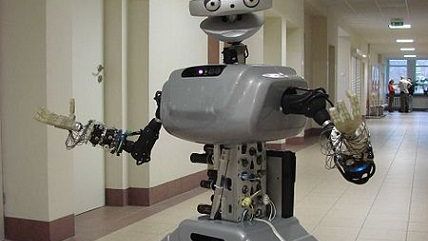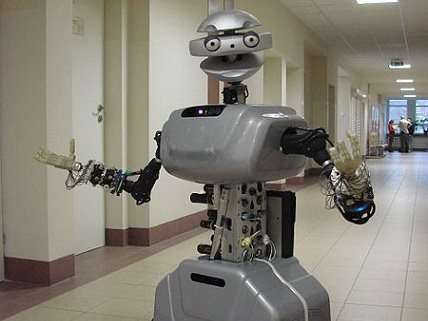The New York Times, For One, Does Not Welcome Our New Robot Servants


Sure, robots make life easier. And despite occasional accidents, they generally make factory work safer, by cutting down on the man-hours required to do dangerous tasks. But what happens when they all start killing us? That's what The New York Times would like to know.
In a recent article titled "As Robotics Advances, Worries of Killer Robots Rise" (seriously), the NYT warns that social fears about robot-on-human killings are increasing and that "experts" believe factory robots pose a mounting risk to the people they work alongside.
These experts were all out to lunch, apparently, since the paper didn't bother to track any of them down—or anyone at all who is freaked out about the mechanical menace. The best the article can manage is a quote from an expert explaining why people might be irrationally afraid of robots:
"It's the fear of robots," said Bryant Walker Smith, a fellow at the Center for Internet and Society at Stanford Law School who studies driverless cars. "There's something scarier about a machine malfunctioning and taking away control from somebody."
Panicking yet? If not, check out this handy infographic provided by the Times, which depicts—in painstaking detail—the 33 robot-caused workplace deaths in the U.S. over the last 30 years.
Factory robots are hardly the only reason the NYT thinks you should fear the future:
But the robots whose generation is being born today collaborate with humans and travel freely in open environments where people live and work. They are products of the declining cost of sensors and improved artificial intelligence algorithms in areas such as machine vision. Google's newest driverless car, for instance, is completely automated, without a steering wheel or a brake pedal.
Along with the new, free-roaming robots come new safety concerns. People worry about what happens if a robot spins out of control, or the first time a driverless car kills someone.
People might worry about that (again, the article doesn't take note of anyone who does), but as Reason's Ronald Bailey has written, recent evidence suggests that they would be generally wrong. In fact, the Times recently reported on two studies that found self-driving cars would greatly increase passenger safety.
Perhaps, "As Robotics Advances, Unfounded Worries of Killer Robots Still Reported By Newspaper" would have been a more accurate headline.


Show Comments (41)